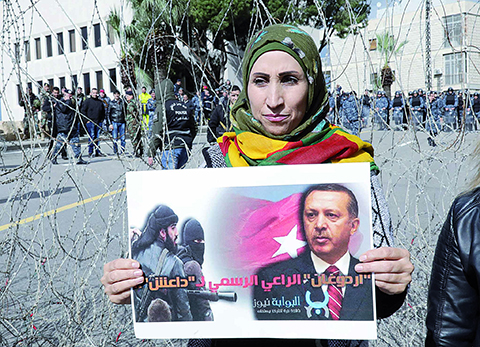 BEIRUT: A Lebanese Kurd holds a placard bearing a portrait of Turkish President Recep Tayyip Erdogan, and reads in Arabic 'Erdogan the officials sponsor of the Islamic State', during a protest near the Turkish embassy, against the ongoing ??Turkish military campaign in the Kurdish-held Syrian enclave of Afrin. - AFP
BEIRUT: A Lebanese Kurd holds a placard bearing a portrait of Turkish President Recep Tayyip Erdogan, and reads in Arabic 'Erdogan the officials sponsor of the Islamic State', during a protest near the Turkish embassy, against the ongoing ??Turkish military campaign in the Kurdish-held Syrian enclave of Afrin. - AFPPARIS: As Turkey presses its offensive against Kurdish fighters in Syria, many Kurds feel let down, not for the first time, by Western powers. Often described as the world's largest people without a state, the ethnic group from the mountains in the heart of the Middle East has been a key ally in the fight against the Islamic State group.
Backed by the Western-led military coalition against the jihadist group, Kurdish peshmerga forces have been praised for being vital and brave foot soldiers in the battle in Syria and Iraq. Now, with Turkey invading a Kurdish enclave in Syria with tanks and artillery, many in the community are looking for payback, but have been left bitterly disappointed. "Before, with the Islamic State, everyone needed us to do the dirty work, but now we've being abandoned," Ismail Akgul, a 55-year-old Kurdish trader living in Paris, told AFP.
The diaspora in Europe is particularly sensitive about what are perceived as half-hearted interventions by their adopted countries, France, Germany or Britain. After NATO member Turkey launched its assault last weekend on the Kurdish People's Protection Units (YPG) militia, which it views as a terror group, European nations urged restraint, but said little else in public. "We have the feeling of being dropped by the international community," Agit Polat from the CDK-F Kurdish organization in France said, after taking aim at the "unacceptable and complicit silence" of the West.
'Always the same'
The Kurds are a Muslim but non-Arab ethnic group in the Middle East and are thought to number 25 to 30 million people across an area that spans Iraq, Turkey, Iran, Armenia and Syria. They have never had their own homeland defined by national borders, but the creation of Kurdistan remains a dream for many in the long-persecuted community. Some hoped the current turmoil in the Middle East would bring it closer.
But the Turkish offensive on the Afrin enclave has left them with a familiar feeling: that a new chapter in a century of betrayal by world powers is being written. Few have forgotten the treatment of the Kurds in Iraq by previous US governments: they were encouraged twice to rebel against Iraqi dictator Saddam Hussein, only to be abandoned and slaughtered in their thousands. And the collapse of the Ottoman empire and the settlement at the end of World War I was meant to lead to the creation of Kurdistan under the 1920 Treaty of Sevres. But it was never ratified and subsequent agreements made no mention of the Kurds.
Today the community is as fragmented as ever, in control of territory in Syria and Iraq. Up to 15,000 ethnic Kurds are expected at a protest in Germany while thousands more are expected in Paris. "It's not the first time that we're left on our own like that," said trader Akgul, with tears in his eyes. "In all the wars, it's the same. We don't trust anyone anymore." - AFP










